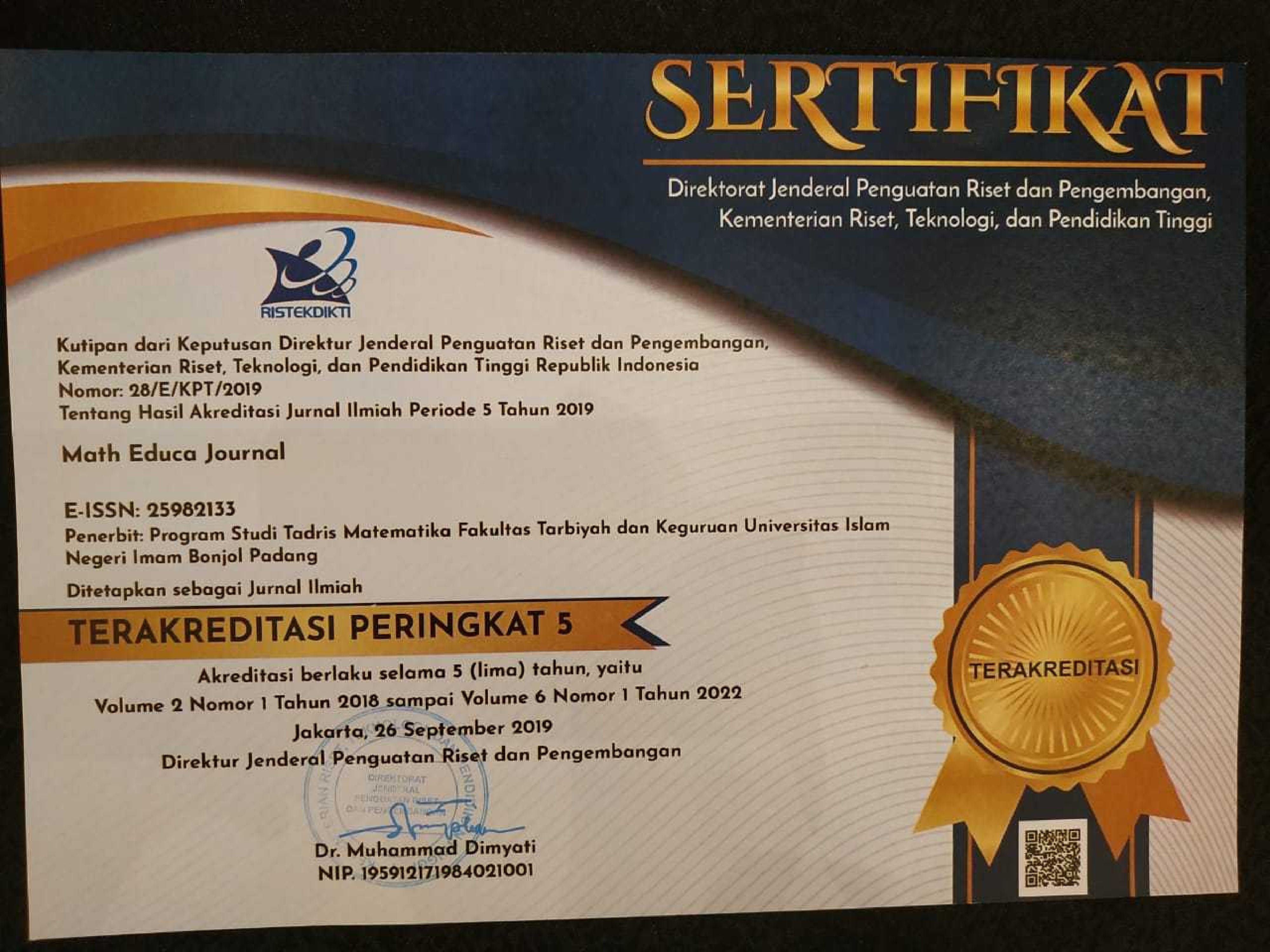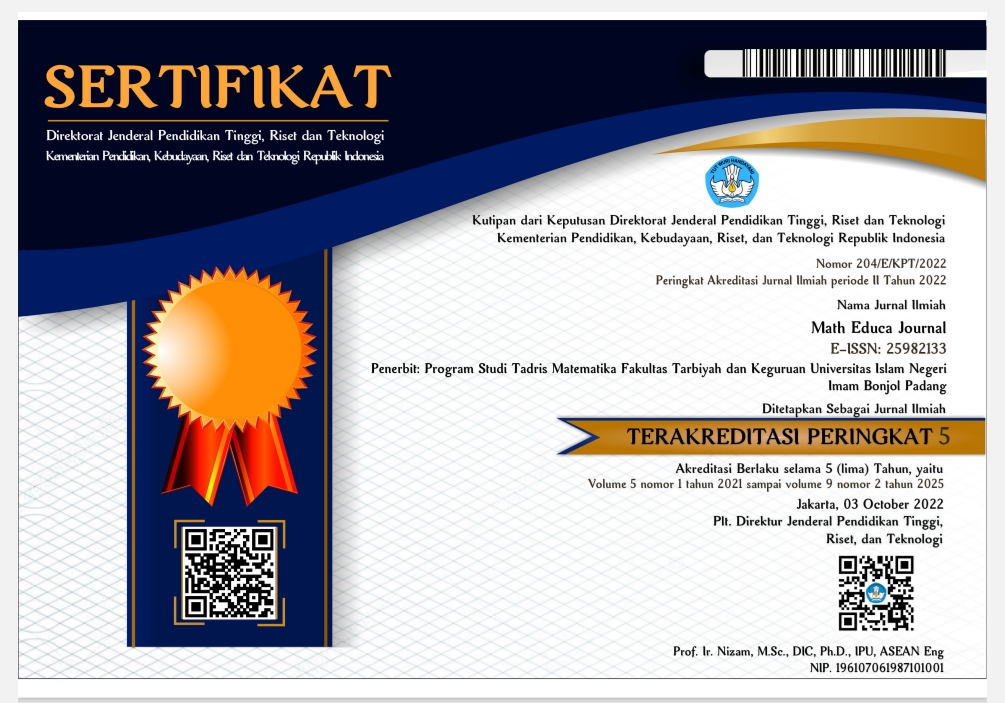PENGEMBANGAN LKPD MATEMATIKA BERBASIS GROUP INVESTIGATION UNTUK MENINGKATKAN KEMAMPUAN KOMUNIKASI MATEMATIS PESERTA DIDIK
Abstract
Keywords
Full Text:
PDFReferences
Anjelicha, E. N., & Ismono, I. (2021). Pengembangan LKPD berorientasi group investigation untuk melatihkan High Order Thinking Skills pada materi laju reaksi. UNESA Journal of Chemical Education, 10(1), 28–37. https://doi.org/10.26740/ujced.v10n1.p28-37
Assalam, I. R., Sriyono, N., & Nurhidayati, N. (2020). Pengembangan lembar kegiatan peserta didik berbasis group investigation untuk menguatkan karakter peserta didik dalam memecahkan masalah. JIPS: Journal Inovasi Pendidikan Sains, 1, 9.
Bate’e, A. (2015). Penerapan Model Pembelajaran kooperatif tipe group investigation untuk meningkatkan motivasi dan hasil belajar Matematika Sd Negeri 4 Idanogawo. Jurnal Bina Gogik, 2(1), 13.
Eliza, R., Fauzan, A., Lufri, -, & Yerizon, -. (2018). Effectiveness of the realistic problem based learning model development toward communication skills and mathematical disposition of vocational High School Student. Proceedings of the 2nd International Conference on Mathematics and Mathematics Education 2018 (ICM2E 2018). Proceedings of the 2nd International Conference on Mathematics and Mathematics Education 2018 (ICM2E 2018), Padang, Indonesia. https://doi.org/10.2991/icm2e-18.2018.21
Eliza, R., & Yulia. (2013). Efektivitas teknik clustering dalam pembelajaran Matematika di Pesantren. Padang: Imam Bonjol Press.
Haniatusaadah, S., & Basir, M. A. (2020). Analisis kemampuan komunikasi Matematis siswa sekolah menengah pertama pada materi Aljabar. Math Educa Journal, 4(1), 14–22. https://doi.org/DOI: https://doi.org/10.15548/mej.v4i1.1151
Jannah, R. R., & Darvina, Y. (2017). Pembuatan Lkpd Berbasis Pembelajaran Kooperatif Tipe Group Investigation (Gi) Pada Materi Usaha, Energi Momentum Dan Impuls Fisika Kelas Xi Semester. Pillar of Physic Education, 9(I), 161–168.
Jayanti, D. P., Meirista, E., & Mayasari, D. (2021). Pengembangan LKS pada materi limit menggunakan model pembelajaran group investigation berbasis komunikasi matematis. Musamus Journal Of Mathematics Education, 3(2), 57–67.
Lukman, H., & Musalini, U. (2004). Cara cerdas menguasai layout, desain dan aplikasi Web. Jakarta: PT Elex Media Computindo.
Maydiantoro, A. (2021). Model-model penelitian pengembangan. Di Akses Dari http://repository.lppm.unila.ac.id/34333/1/Model-Model%20Penelitian%20dan%20Pengembangan.pdf tanggal 24 April 2022, 8.
Nurdin, E., Risnawati, R., & Ayurila, M. (2019). Pengembangan lembar kerja siswa berbasis group investigation untuk memfasilitasi kemampuan penalaran matematis siswa SMP. JURING (Journal for Research in Mathematics Learning), 1(3), 219. https://doi.org/10.24014/juring.v1i3.6752
Putrawangsa, S. (2018). Desain Pembelajaran: Desain research sebagai Pendekatan pembelajaran. Mataram: CV Reka Karya Amerta.
Sabirin, M., Aminah, S., & Atsnan, M. F. (2021). Students’ skills performing on mathematical reasoning and communication through group investigation learning model. 17.
Shoimin, A. (2013). 68 Model pembelajaran inovatif dalam Kurikulum 2013. Jakarta: Azzura Media.
Sugiyono. (2015). Metode penelitian kuantitaif, kualitatif, dan R & D. Bandung: Alfabeta.
Susanto, A. (2013). Teori belajar dan pembelajaran di Sekolah Dasar. Jakarta: Kencana Prenada Media.
Umbaryati, U. (2016). Pentingnya LKPD pada pendekatan saintific pembelajaran Matematika. Prisma, Proceeding Seminar Nasional Matematika Yang Diselenggarakan Oleh Universitas Lampung, 217–225.
Utami, C., & Djuniadi, D. (2015). Pembelajaran model generatif dengan strategi group investigation untuk meningkatkan kemampuan komunikasi matematis siswa. Unnes Journal of Mathematics Education Research, 4(1), 26–33.
Refbacks
- There are currently no refbacks.

This work is licensed under a Creative Commons Attribution-NonCommercial-ShareAlike 4.0 International License.
The Journal Space of the Mathematics Education Department
Faculty of Education and Teacher Training
State Islamic University of Imam Bonjol Padang
Email: mej.uinibpadang@gmail.com

Math Educa Journal is licensed under a Lisensi Creative Commons Atribusi-NonKomersial 4.0 Internasional.
Based on a work at https://ejournal.uinib.ac.id/jurnal/index.php/matheduca.
All rights reserved p-ISSN: 2580-6726 | e-ISSN: 2598-2133




